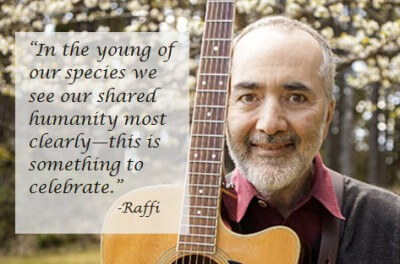
Many of our cherished memories are tied to childhood and music. Today, neuroscience is beginning to understand how music heals the body, influences our emotions, sparks creativity, and even connects us with nature.
From infancy onward, I tried to fill my daughter’s life with melody – from classical to folk music. I even wrote and composed a song, “Sarah’s Lullaby,” that I sang night after night for most of her early years. Today, as a young adult, Sarah and I still share a special bond around music that grew from her childhood. Many of our family values about love, life, and nature were reinforced by the songs we sang together.
One of the folk musicians we adored in the 1980’s was Raffi Cavoukian, better known simply as “Raffi.” I had lost touch with his music and career until recently when we met and discovered synergistic perspectives about child and adolescent development. Over Raffi’s long career as a child troubadour, it was obvious he fell in love with the pure beauty of how a child develops from infancy to young adulthood.
It was my pleasure to interview Raffi about two topics for which he has great passion. In this article, we talk about his approach to child development and his nonprofit Centre for Child Honouring. In a second article at Psychology Today, Raffi discusses Internet safety and a story that is not getting enough press today – how the dark side of the Internet affects the development of children and teens.
An Interview with Raffi
The following interview with Raffi Cavoukian took place in August of 2014:
Marilyn: What a delight to connect with you and share your work with my readers! During your thirty-year career, what has been your greatest learning about children and what they need to thrive in life?
Raffi: Two things come to mind. First, I learned that a young child is a whole person, as whole at an early stage of life as an adult is whole at a later stage. This means that children are not lesser beings; they are simply at an early stage of life, the all-important formative stage.
Secondly, I learned that the early years are the most important period of a person’s development, because how the human story begins impacts a lifetime of outcomes. These years are called ‘formative’ with good reason. What’s forming is both the physical growth and development of the brain and all bodily systems, and also the emotional self and how it feels to be alive!
Marilyn: Raffi, it’s obvious from reading about the Centre for Child Honouring that you have gleaned a great deal from child development experts worldwide. What is the message you hope to share through your Centre?
Raffi: The Centre’s mission is to advance Child Honouring as a universal ethic, to be lived in locally wise ways all around the world. In the young of our species we see our shared humanity most clearly—this is something to celebrate.
The infant of every culture, regardless of ethnic origin or social standing, is the same physiological being! This truth of human existence can unite the human family in the knowledge that we all begin life exactly the same, and we can appreciate our differences, not fear them.
Marilyn: In your book, Child Honouring: How to Turn This World Around, you collaborated with a number of well-known authors to make a case for change through a “compassion revolution.” If such a shift in our culture were to take place, what would it look and feel like to you?
Raffi: A compassion revolution to spark a child-honoring era would take many forms. A Covenant for Honouring Children and its nine principles would become a compass for conscious living. At the root of it all would be a realization of the critical importance of early years’ experience as a precursor to what comes later.
As the meaning of the word ‘formative’ became fully understood by parents, teachers, and policy makers, we would infuse our institutions with the Child Honouring ethic and thus begin a profound re-ordering of societal priorities. Current best practices in parental leave policies (in Scandinavian countries) would become the norm in all countries. Affordable high-quality child care would abound. Conscious parenting practice would heal parents’ own childhood wounds so that they weren’t unconsciously passed onto their offspring.
We’d see an eco-industrial revolution in the materials, processes, and products now designed to be child-friendly and, thus, Earth-friendly. Our economy would change from its bottom-line fixation to a triple-bottom-line model in which social and environmental impacts would be considered along with monetary returns. Child Impact Assessments of major decisions would help these be made with the child in mind. Every student would understand the equation: child-friendly equals Earth-friendly.
We would take a rational leap towards a truly sustainable economy—a low-carbon economy that rewards environmentally benign design and socially inclusive business, reduces waste and pollution, and embraces Child Honouring family policies. We would wonder why we ever settled for less.
Marilyn: What I love about your thinking, Raffi, is that you put child development into a systemic framework that connects earth and humanity. This is such an important concept! I remember Paul Simon once said, “Music is forever; music should grow and mature with you, following you right on up until you die.” Getting back to your musical roots, I understand you just released a new CD, your first new album for children in over a decade. What new thoughts or emotions do you want children and adults to hear and feel through it?
Raffi: Paul’s right. In 2012, I visited Pete Seeger at his home and sang with him at the Clearwater Music Festival. I’ve been a huge Seeger fan and so, once again, he inspired me to the core. We troubadours need to make music, to sing the news of the day, to sing of love in a new way in a new age. In recent months I felt the urge to express myself musically with new songs, songs that fully celebrate the real world, songs that might charm listeners to both toe tapping and gentle wonder. Love Bug is the first Raffi CD of the digital era.
The songs invite social and emotional learning by the young and easily pull other family members to join in. Love Bug engages the mysteries and wonder of the human heart, that “pump of flowing happiness” as the song “Seeing the Heart” puts it. I hope Love Bug is highly contagious—our world could use a good virus!
Marilyn: Raffi, thanks so much for taking the time to talk about child development and how your music is inspired by your values. I hope parents and teachers will read more about the principles of Child Honouring and embrace it as a vision for the future.
[Read the second part of Raffi’s interview “Is the Web a Vast Sociological Experiment?” at Psychology Today.]
Published: July 29, 2014
Tags: back-to-school, child development, Family-School Partnerships, gratitude, happiness, learning, parenting, positive values, positive youth development


